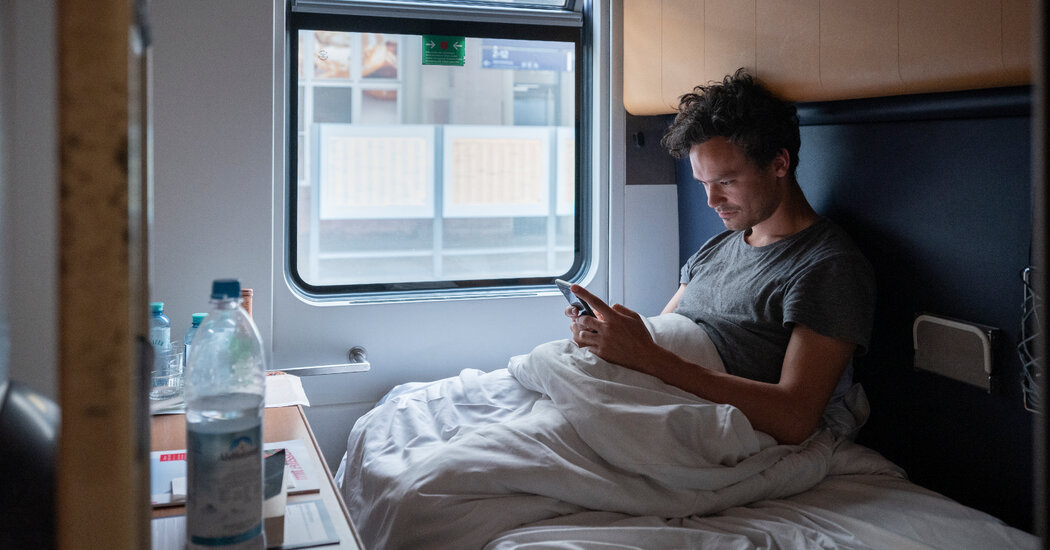
Ever dream of going to bed in Vienna on a stomach full of Wiener schnitzel, rumbling across the European countryside on a night train, and waking up to a buttery croissant in Paris?
You’d better move fast. That train is leaving the station — perhaps permanently.
Overnight rail routes linking the French capital to Berlin and Vienna will be discontinued because of budget cuts, the railway authorities announced this week, fueling concerns that Europe’s night train renaissance could lose momentum.
The routes were revived with great fanfare in 2023 by officials who promoted them as environmentally friendly alternatives to air travel that would bring European neighbors closer together and cater to growing interest in slow travel.
But France now faces a budget crunch, with a widening deficit and debt. The country’s national railway company, the S.N.C.F, said on Monday that the government had decided to cut state subsidies that were “indispensable” to keep overnight trains running.
The lines, run jointly by several European railway companies, will cease operating on Dec. 14, the S.N.C.F. said in a statement.
That was a bitter disappointment for travelers who had cheered the return of European sleeper trains years after competition from low-cost airlines had largely put them out of business.
“There’s something very vintage about taking a night train,” said Morgane Bradaïa, 26, who lives in Paris and estimated that she had traveled overnight to and from Vienna about 30 times to visit family.
Ms. Bradaïa, who has also taken night trains to Hungary and Italy, expressed frustration over the line being discontinued. “It is absurd to take a plane to travel 1,500 kilometers,” she said. “It’s also about traveling on a human scale, really grasping the time it takes to travel.”
Despite such disruptions, the night train connecting Paris to Vienna and Berlin had an average occupancy rate of 70 percent in 2024, according to the S.N.C.F., representing about 66,000 travelers. But overnight routes are inherently less cost-effective and more reliant on public subsidies than regular lines, it said.
“While a seat on an airplane can be sold up to five times a day and a seat on a daytime train up to four times, a seat on a night train can only be sold once a day,” the S.N.C.F. said.
Night service also requires more staffing and uses more energy, it said. And with different countries sometimes using different signals, power systems and tracks, the trains face logistical challenges like crew and locomotive changes.
France’s transportation ministry did not respond to a request for comment. But it told the Agence France-Presse that the decision to cut about 10 million euros in subsidies was part of broader budget plans to save 44 billion euros and to prioritize domestic trains.
France has ramped up overnight domestic train services in recent years, with eight lines that connect Paris to cities that include Nice and Toulouse.
Arnaud Aymé, a transportation expert at the Sia Partners consulting firm, said that ending international service owed more to France’s dire finances than to problems with overnight routes.
“These past two years had shown that the trains were finding their customers,” Mr. Aymé said. A 70 percent occupancy rate is “quite respectable,” he said, especially for trains that run only three times a week, are sometimes plagued by delays, and rely on older equipment.
Still, he said, until operators find ways to maximize occupancy and revenue, “it’s an economic model that requires the state to pitch in.”
ÖBB, Austria’s state-owned federal railway, expressed regret over the discontinuation, noting in a statement on Monday that night trains “can only be operated with the participation of international partners.”
A train operating under ÖBB’s Nightjet brand will still run three times a week between Vienna and Brussels, the company said, adding that it would continue to invest in other night routes like Vienna to Amsterdam or Munich to Rome.
Travelers can still take a daytime high-speed train between Paris and Berlin that was announced last year. But Fabienne Keller, a centrist lawmaker from France at the European Parliament, called the discontinuation of overnight service a “shock.”
“Beyond the powerful symbol of cooperation and friendship between European countries that these lines represent, medium- and long-distance night trains are currently the only credible, low-carbon alternative to air travel,” Ms. Keller wrote in a letter to the French ministers for transportation and European affairs that she published on social media.
Addressing budget woes “must not come at the expense of our commitments to combat global warming,” she said, calling the discontinuation “all the more difficult to understand that it comes at a time when passengers have shown real enthusiasm for night trains.”
Ségolène Le Stradic contributed reporting from Paris and Christopher F. Schuetze from Berlin.



